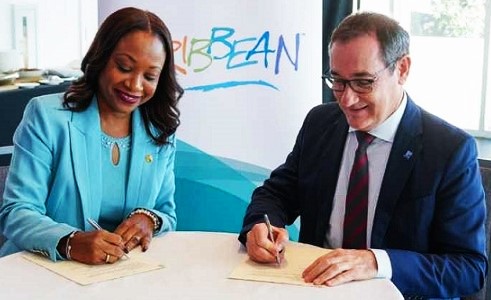A frugal mum has told how she cooked up six weeks’ worth of evening meals for her family of three from as little as 24p each.
Cash savvy Jeni Dearing whipped up 132 healthy meals using cupboard essentials from budget supermarkets, vegetables from her local market, and a low-cost meat hamper from musclefood, with each portion costing 75p on average.
The thrifty mum, who lives in Bromley with her husband, Kevin, and eight-year-old son, Ronnie, prepared 25 different meals over the course of six weeks by batch cooking every few days and storing portions in the freezer.
44-year-old Jeni used a £79 musclefood hamper and spent just £20 on other essentials such as yellow sticker items from budget supermarkets and veggies from her local market.
The hamper’s contents included chicken breasts, free range steak burgers, low fat bacon medallions and extra lean pork sausages, as well as a pork pasta meal kit and a chicken tikka masala curry kit.
From her £99 spend, Jeni planned her ingredients and costings before preparing a number of tasty and balanced meals including chicken and sweetcorn noodle soup, bacon and onion pasties, and toad in the hole, for as little as £1.41 per meal.
Jeni also managed to cook and prepare a roast chicken dinner for 10 which worked out at just 74p per head.
She began shopping and cooking frugally around the time her son was born in order to cut down on her household’s weekly food shop spend, and documents her cook-ups on her Instagram page.
Jeni and husband Kevin also house foreign students that attend a local language college, and often have to provide breakfast and dinner for them too, so prefer to keep costs low where possible.
Since she started to cook in batches, Jeni has saved at least £80 each month on the food shop.
In order to make meals go further, and to make them healthier in general, Jeni bulks out Bolognese and chilli con carne with loads of extra vegetables like onion, celery, carrots and peppers.
She also adds tinned beans such as chick peas and butter beans to curries and stews as they’re cheap, filling and absorb the flavour of the meat.
Jeni said: “I started batch cooking around the time my son was born. At the time, we lived in Cornwall, and I found that I just didn’t have the time to go food shopping in the evenings like I used to.
“Instead, I’d pop to the fruit and veg market once a fortnight and then stock up on other essentials when needed.
“Now, I tend to prefer to cook healthy, low-calorie meals to keep the pounds off, with lean meat where possible, and lots of veggies.
“I’m not one to plan meals weeks in advance, I just buy whatever veg is on offer and great value, then base meals around the veg and grab the meat from the freezer to go with them.
“For example, if I picked up lots of cheap peppers, courgettes and aubergines from the market, I’ll couple them with chicken breasts or pork from the freezer to make a rogan josh, stir fried pork or Spanish chicken.
“I’m quite fortunate as my son isn’t a terribly fussy eater. He actually loves his meat and steak night is his favourite, but we didn’t tend to eat lots of it as it can get quite costly in the supermarkets.
“musclefood just go to prove that it doesn’t have to be that way, though. We were all super excited for our delivery to arrive and I was a bit taken aback when it did – there are more items in the hamper than what I expected! Our freezer definitely took a bit of a battering.
She continued: “The hampers are fantastic value and great for people who enjoy batch cooking. The meat is really good quality too – plus there’s so much to choose from.
“It’s always worth buying lower fat, quality meat as it means you’re not wasting money draining off fat to throw away.
“One of my favourite things to do is chuck a load of chicken in the slow cooker and leave it throughout the day – then you’ve got lots of portions of shredded chicken which goes with pretty much anything.
“I also used the lean beef mince to cook a big batch of Bolognese which I then portioned up with pasta and popped in the freezer. Each portion worked out at about 250kcals, so it’s a balanced and easy option to pull out for a quick lunch throughout the day.
“It also goes without saying, but I’d always recommend scouring your yellow aisles too. I managed to pick up some sausage meat for just 50p which I used for a roast dinner.”
Jeni added: “One of the most important reasons I batch cook, as well as to save money, is to save time.
“Batch cooking also means we’re not as tempted to have a takeaway because there’s always a few curries ready and waiting in the freezer – meaning we save more that way, too.”
Cat thefts recorded by police from 2015 to 2018 revealed a sharp increase of 114% during this time. Yorkshire-based pet insurance company The Insurance Emporium have been working with pet theft reform campaigners Pet Theft Awareness on insights into cat theft trends in the UK.
Pet Theft Awareness requested information on cat theft from 48 police authorities* across the UK. This revealed that the striking Bengal cat seemed to be at greatest risk of being stolen, with 19% of all recorded thefts being for this type of cat**. Bengals are particularly sought after as pets, their surge in popularity possibly being linked to several high profile celebrity Bengal owners such as Kourtney Kardashian, Liz Hurley and Bruce Springsteen.
Not far behind were the pricey British Shorthair cats, including the popular British Blue, accounting for 14% of recorded cat thefts. The aristocratic-looking and expensive Persian cat followed at 11%.
Some police authorities*** recorded significantly higher numbers of cat thefts than others. The Metropolitan Police was the UK’s number one cat theft hotspot, with 18% of all recorded cat thefts in the UK. However actual police prosecution or cautions followed in just 1% of the Metropolitan Police’s recorded cases. This was in stark contrast to Cumbria Constabulary where 50% of recorded cat thefts were converted into police cautions.
Whilst cat theft may at first glance appear to be more common in some areas, this could well be down to a lack of uniformity in the way police record and enforce cat theft. For example 100% of cat thefts prosecuted in West Mercia all occurred during 2018, with none between 2015 and 2017. Could this be due to improvements in their processes, or a new willingness by West Mercia police to take cat theft seriously as a crime?
Responding to these statistics, Pet Theft Awareness Campaigner Toni Clarke, and owner of missing pedigree cat Clooney, said:
“When my beloved Siamese cat Clooney vanished in 2013 after a courier van was seen driving away from our rural home, police officers quoted a cat’s right to roam to me and refused to record him as missing or stolen even though I had good reason to suspect the crime of cat theft.”
Richard Jordan of Pet Theft Awareness said: “Cat theft is a crime which seems to be on the up. We are campaigning for cat theft reform so that when a cat disappears, the assumption that it has gone walkabout is replaced with proper police recording, enforcement and uniformity of approach across the board.”










